Meet Zahra, the Hand in Hand trainer fighting Covid-19
When Zahra started working for Hand in Hand six months ago, the 25-year-old thought she’d be training women to run their own micro-businesses, helping them thrive in the long term. Now, as the country braces for a Covid-19 crisis some experts fear could be globally significant, Hand in Hand’s youngest trainer finds herself fighting for their short-term survival instead.
“It’s a very heavy responsibility and we feel a sense of fear. If someone has the virus, it’s difficult to control it,” says Zahra. “On the other hand, it’s a pleasure to help our people, who are really in need and live in poverty.”
Across Hand in Hand Afghanistan the story is the same, as the entire organisation retools – seemingly overnight – to respond to the threat of the virus. Between thousands of members living in hard-to-reach areas, deep bonds with local officials, and a senior management team with decades of humanitarian experience, Hand in Hand Afghanistan is uniquely well-suited to help. So when a government lockdown caused the suspension of our usual training on 30 March, we were ready to adapt and keep fighting.
Phase One of Hand in Hand Afghanistan’s Covid-19 Emergency Response kicks into gear on 5 April, as teams fan out across Parwan, Balkh and Herat Provinces delivering soap, chlorine solution and virus prevention training to some 26,000 people. Fundraising for Phase 2, where we hope to at least double that number, is underway now.
“We consider it our duty to inform people about methods of prevention. We can save lives,” says Zahra. “I had dozens of members who weren’t aware about the coronavirus and how to reduce the risk of infection until I told them.”
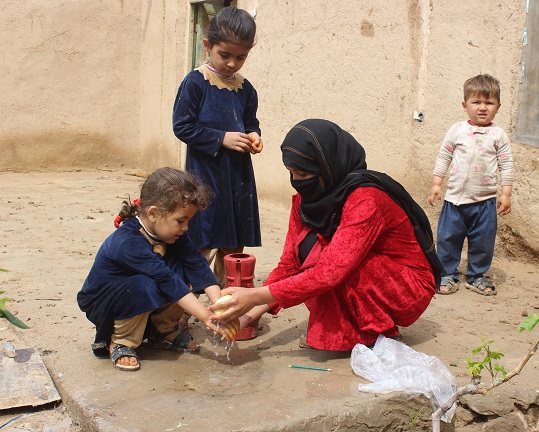
Handwashing time for Sharifa and family.
Sharifa, 24, was one of them.
“Zahra told us about coronavirus and how dangerous it is,” says the mother of four young children. “She gave me and other women health instructions such as not to go to crowded places; to wash our hands repeatedly with soap many times throughout the day; to use a mask and gloves, which we have for our poultry farm, if we go out in public; and to cover our mouths with a cloth when we sneeze.”
With no health services in the area, Zahra worries that Hand in Hand’s is the only help Sharifa and thousands more like her will get. “And even if they can make it to the public hospital in Mazar, we know their capacity is very low. They don’t have the equipment to cope,” she says.
One day, Covid-19 will pass – a global health crisis leaving a global economic crisis in its wake. When that day comes, Hand in Hand will be ready to help our members work their own way out of poverty, the same we have since Day One. Until then, we’re fighting Covid-19 with everything we’ve got.
“The second thing I worry about right now is the financial aspect,” says Sharifa. “The first thing is our health.”
By the numbers
4,000 households reached
26,000 Afghans provided with soap and chlorine solution
20 minutes of virus prevention training per household
‘Life was getting worse by the day’: Rozi Khal
Rozi Khal was 13 years old when her first-born son, almost a newborn, was injured in the Soviet-Afghan War. The incident sent her packing for Pakistan, and the heaving refugee camp her family would call home for the next 27 years.
“We didn’t have anything. My husband worked as labourer in Queta city doing very tough work which made him sick. Now he can hardly move,” says Rozi Khal, now 45. “We returned to Afghanistan five years ago. Life was getting worse by the day. until Hand in Hand Afghanistan arrived in our village.”
Qaleen Bafan, Afghanistan
Afghanistan’s displacement crisis
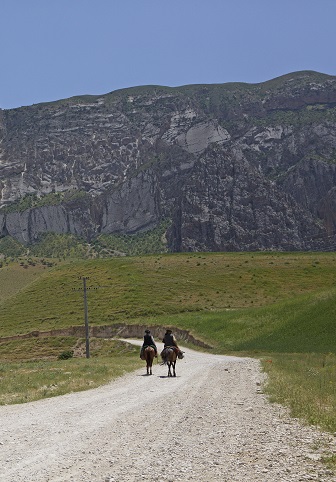 Rozi Khal’s cicumstance is far from unique. Between returning refugees like her and the multitudes of people displaced within Afghanistan by drought and conflict, some 3.5 million Afghans have forced to relocate in recent years – the equivalent, in sheer scale, of the entire population of California being displaced within the US. This in a country with none of the wealth or infrastructure that other countries take for granted.
Rozi Khal’s cicumstance is far from unique. Between returning refugees like her and the multitudes of people displaced within Afghanistan by drought and conflict, some 3.5 million Afghans have forced to relocate in recent years – the equivalent, in sheer scale, of the entire population of California being displaced within the US. This in a country with none of the wealth or infrastructure that other countries take for granted.
In September 2017, Hand in Hand partnered with Deutsche Gesellschaft für Internationale Zusammenarbeit (GIZ), the German government’s development agency, to help displaced Afghans work their way towards a prosperous future in the country’s growing poultry value chain. By summer 2020, we’ll have helped 4,250 of them launch their own sustainable poultry farms.
Afghanistan’s poultry value chain is ideal for returnees and internally displaced people. Skills are easily learned. Incomes, compared to other rural sectors, are high. And for people like Rozi Khal, the benefits don’t end there. Poultry farms can be run from entrepreneurs’ own households – crucial for members with restricted mobility. At the same time, nutrition and food security improve – a matter of particular interest to those responsible for childcare.
A bright future
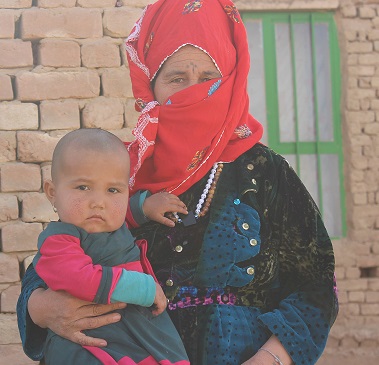
Rozi Khal holds her daughter.
One day, Rozi Khal received a knock at her door. It was a Hand in Hand trainer: would she like to become a member? Rozi Khal joined a Self-Help Group in Qaleen Bafan village, Balkh Province, and received poultry vocational skills training. Next, she built a backyard poultry farm with the support and guidance of her Hand in Hand trainer. “I never had a business idea until I learnt in training that I can have a business in my home,” says the mother of seven. “The poultry enterprise enables me to earn a decent income and help my family.”
With her training complete and chicken coop built, Rozi Khal received 25 chickens, two bags of feed and some other materials she would need to launch her business. Today, she produces 20 eggs a day, earning approximately AFN 2,400 (US $32) a month.
“Now I’m earning more than I used to working in a brickmaking factory, which was very difficult work,” she says. “The training and support I received from Hand in Hand has encouraged me to start the enterprise and now I am confident I will generate a good income.”
As for the future? “I am planning to expand my enterprise within the coming months to increase my brood because there is a good market for eggs,” she says.
By the numbers
Producing 140 eggs a week
Earning AFN 2,400 (US $32) a month
Caring for family of 9
Meet Mahgul, who hatched a plan after her forced relocation
To Mahgul, Pakistan was home. It was where she was born to parents who sought refuge from the Soviet-Afghan War in the late 1980s. It was where she met the man who became her husband and where she gave birth to her first two children.
That all changed nine years ago when the Pakistani government destroyed the refugee camp where she and her family had been living. They were forced over the border to Mahgul’s parents’ homeland, from where the government assumed she had come.
“We didn’t know anything about Afghanistan except that our families were originally from there,” Mahgul said. “We were forced to leave Pakistan and came to Afghanistan, but we didn’t have anything here: no home, no family and no relatives.”
Mahgul and her family were forced to start anew, and now, with help from Hand in Hand, their once-dim future is shining bright. Not only has she settled into her new home in Balkh province, she has learned how to raise chickens, earning an income that has helped support her family.
Balkh Province, Afghanistan
A continuing crisis
Three million people arrived on Europe’s shores hungry and desperate for work during the migrant crisis of 2015-16. Imagine, however, if more than 50 million people had arrived instead, and that Europe was one of the most impoverished places on earth, lacking not only the ability to house those who arrived but also the ability to care for and support them.
That, proportionally, is the problem facing Afghanistan, which has seen millions of people flee their homes over the past three decades because of conflict. More than 2.5 million people are expected to arrive in the country over the next two years from places such as Pakistan and Iran, even as another 1.8 million internally displaced people (IDPs) settle elsewhere in the country to escape intensified conflict.
Establishing a home
Mahgul and her family spent more than a year in Afghanistan living in a tent before they, and other migrants, were taught by the UN Refugee Agency how to build shelter. Mahgul’s husband found work as a shopkeeper, and they settled into their new lives in the village of Mahajir Qeshlaq, in the Sholgara district of Balkh province.
But for Mahgul, now 30, the desire to continue to make a better future for her family remained strong. Last year, she learned about Hand in Hand Afghanistan and, excited by the prospect of earning an income, joined the programme to learn the basics of poultry farming.
Over five days, Mahgul learned not only how to properly raise and care for chickens, but also how to run and develop a business and manage her finances. At the end of her training, she received her own chickens, as well as feed and a number of tools, as part of an enterprise start-up kit designed to help her succeed.
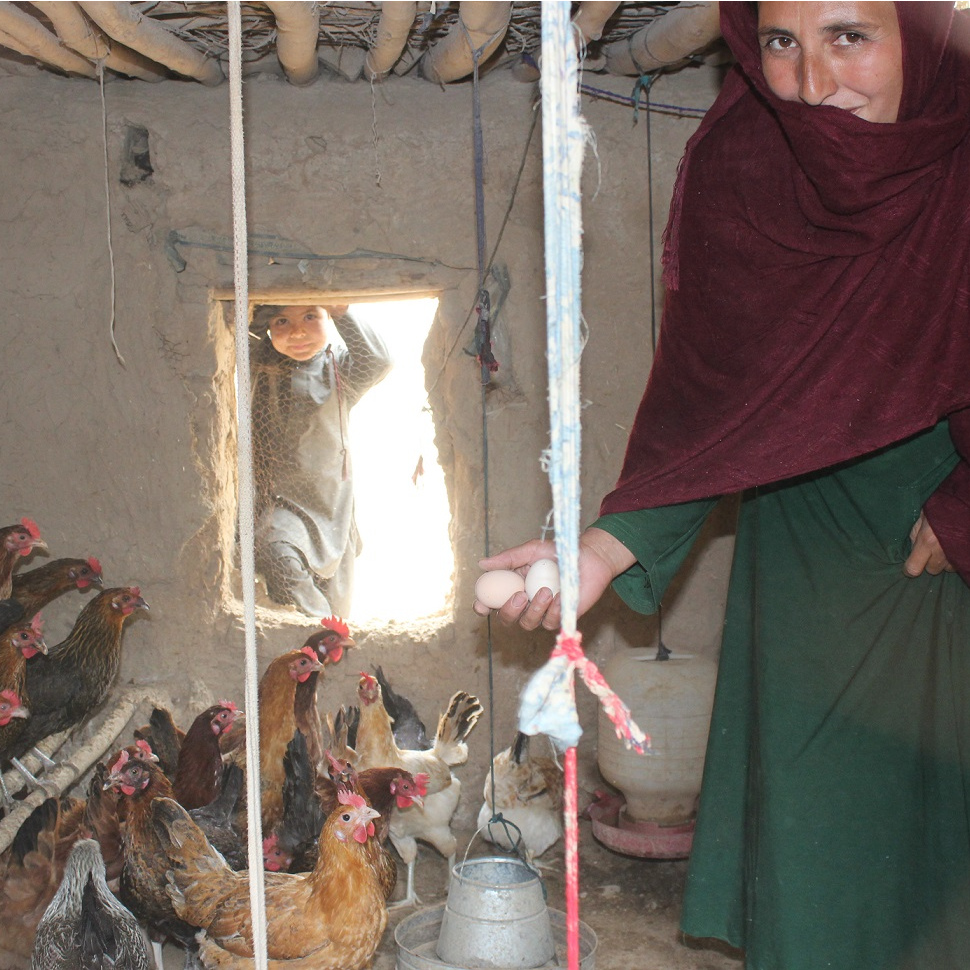
Forging a future
Not even a year into her new endeavour, Mahgul’s farm has grown to include 32 chickens that produce an average of 20 eggs each day. Though some are kept to help feed her family, she sells most of them, earning a monthly income of nearly 3,000 AFN (US $40).
That income has not only helped her support her family, but it has also allowed her to help put her children through school.
Less than a decade ago, Mahgul was left helpless as she and her family were forcibly deported from her home. Now, she has not only been empowered to forge her own future, but she has cultivated one for her children as well.
Mahgul’s results
Settled after forced relocation to Afghanistan
Increased monthly income from 0 to 3,000 AFN (US $40)
Able to contribute to school fees for her children
Meet Frozan, who has created a buzz around Marmul
Frozan, 18, lives in north Afghanistan, a corner of the world where opportunity is scarce. Still, that never stopped her from dreaming. “We are a big family and my father, a farmer, was the only one earning – it was never enough. I have always wanted to do something to help but I didn’t know how.”
Didn’t, that is, until she met Hand in Hand. Frozan joined a Self-Help Group and quickly became a star pupil. Training led to a business plan, which led to a loan from fellow group members. Finally, she was ready: the newest and youngest beekeeper in her village. Her business has not only helped put her through school, but it has done the same for her younger siblings and even helped her parents provide for the family.
Mazar-i-Sharif, Balkh Province, Afghanistan
Keeping busy
As a student, Frozan had already achieved more than her peers, but a desire to help her family would not let her stop there.
After joining the Shogufa SHG, Frozan attended regular meetings and supplemented her schoolwork with training on microfinance, bookkeeping and business development.
“I was keen to have a business from the first group meeting until I completed [business development] training, when I understood how to run a business and what I should consider before starting a business,” Frozan said. “Therefore, with the help of my trainer, I developed a business plan.”
Frozan carried out a study of the Marmul district in the Balkh province in northern Afghanistan and learnt that there was a high demand for honey. After further research, she discovered that beekeeping doesn’t require much labour – a perfect arrangement for a full-time student – and so she applied for and obtained a microloan of 10,000 afghanis (US $140) so that she could purchase two boxes of bees.
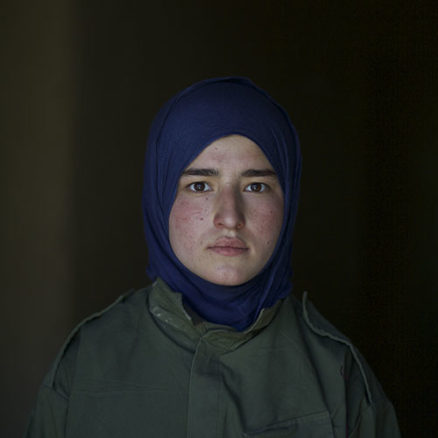
Sweet success
As the youngest person in Marmul to keep bees, the SHG taught Frozan the skills she needed to look after them, as well as how to extract the honey and improve its quality and volume.
After her first year, she had harvested 16 kg (35 lbs) of honey, making enough to not only repay the microloan but to leave her with a small profit. She invested that back into her business by buying more bees, and last year, she earned 120,000 afghanis ($1,728) from the 120 kg (265 lbs) of honey produced by a collection of what had grown to 20 beehives.
“After first year of my business, I was amazed to see the results,” Frozan said. “I repaid the loan and expanded my business. Now I am paying school expenses of my two younger siblings, helping my dad in home expenses and I have my own savings for emergencies.”
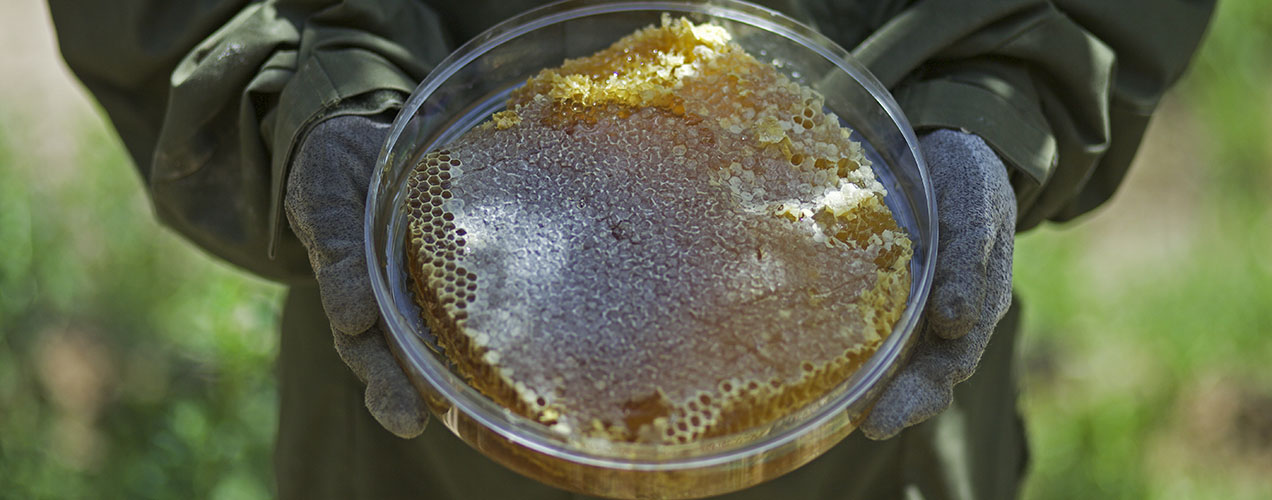
Frozan’s classmates have told her they have been inspired by her business and that they would like to set up their own.
“People having a business like me can help their families to overcome financial challenges, save for emergencies and take active part in developing economy of their communities,” she said.
“Now I have learnt how to manage my activities and time, and work confidently in order to improve our lives. I am also saving for expanding my business, which will in turn generate more income for me in the future.”
Frozan’s results
Increased monthly income from 0 to 10,000 AFN (US $144)
Able to contribute to school fees for her siblings
Inspired classmates to create their own businesses
Meet Cecily, whose vertical farm has taken flight
Fifteen square meters isn’t just the size of Cecily Wawira’s rented smallholder farm. For years, it was the boundary imposed on her ambitions. But after learning an innovative growing technique called ‘vertical farming’ from a Hand in Hand Self-Help Group – along with the basics of entrepreneurship – things are looking, well, up.
“Many people here are down economically,” says the 44-year-old grandmother from Embu County, Kenya. “If they can be empowered and lifted up the same way we have, they too can become active and do things the way we are doing them now.”
Embu County, Kenya
Making ends meet
Life is changing rapidly in urbanising Embu County, home to more than 500,000 people. According to the Kenya National Bureau of Statistics, 28.2 percent of residents live below the poverty line, which the World Bank classifies as earning less than US $1.90 a day.
For those still working as smallholder farmers, life can especially hard. Problems affecting farming in this arid region range from an unpredictable climate and scarcity of water to, for thousands like Cecily, a simple lack of land.
Maximising growth
For much of her life, Cecily was a casual labourer who struggled to make enough money to purchase even basic necessities.
She rarely made more than KES 250 (US $2.50), which made it difficult for her and her husband to provide not only for themselves, but also for their two children.
“If I wanted to eat an egg or vegetables or meat, I went asking for a loan in the shop,” Cecily said.
Her fortunes changed early last year, when she learned about the Mathayo Women Self-Help Group.
With generous support from the IKEA Foundation, Hand in Hand trainers led regular morning meetings in which the women were taught the fundamentals of running their own business.
“I listened to them and I heard they had good things to say, such as the importance of having savings to improve my life and how I will benefit,” Cecily said.
That rekindled her interest in farming, but because of a lack of land, she had to be creative. With the support of the Self-Help Group, Cecily learned how to set up a vertical farm – a series of outdoor shelves holding bags of soil where vegetables grow – to maximise her limited space.
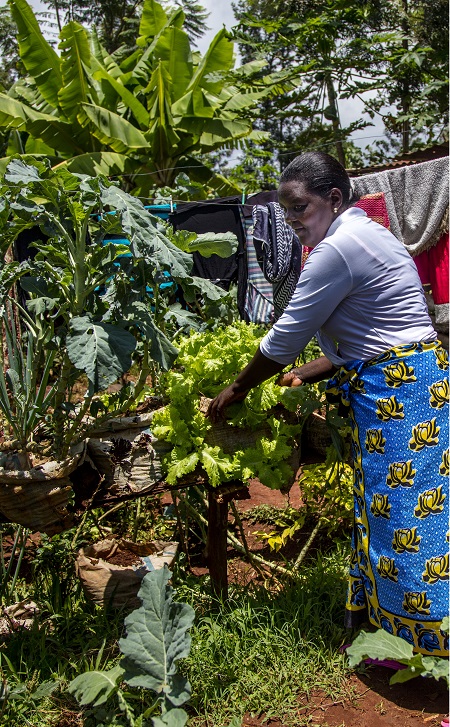
“Because here land is small, I see it’s important to plant that way,” Cecily said. “Now I benefit by eating the vegetables – spinach, kale and amaranth – and there are others I sell.”
Spreading her wings
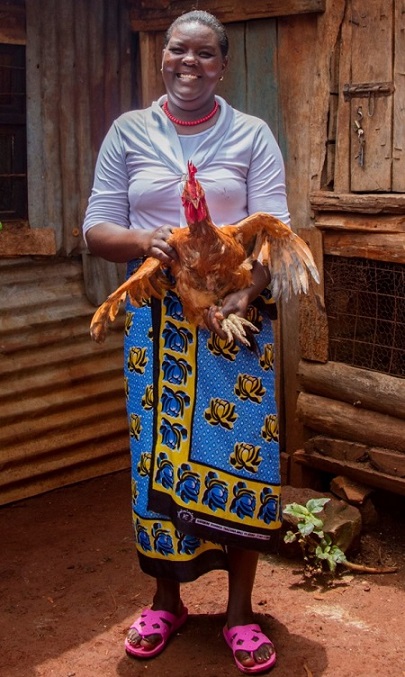
IKEA Foundation projects Embu run by Hand in Hand East Africa.
Cecily’s calculations were correct. She was soon able to sell her vegetables, keeping some of the profit as an income and reinvesting the rest. She then began retailing bananas, which she sold for a weekly profit of KES 2,000 (US $20).
Within time, the profits from the vegetable farm and the bananas helped her dream grow bigger. Now, Cecily raises chickens and sells eggs for KES 25 (US $0.25) each. She even uses the manure as a fertiliser for the soil in which she grows the vegetables.
“The biggest difference is that I am very busy doing a lot of things and I am making good money,” she said.
Each day, Cecily aims to put aside a portion of her profit for her savings. She has been able to help her children, aged 24 and 22 with children of their own, to support their families. She has also noticed her neighbours have set up their own vertical farms.
And, with the money she has earned from her growing business, she and her husband have a new financial goal.
“Eventually I want to build my own house so I can improve my life,” Cecily said.
Cecily’s results
Set up her own farming business
Reinvested profits in order to expand
Set goal to one day own home and land
Meet Bernhard, the entrepreneur with a micro-business empire
Two years ago, Bernhard was running a small photocopying and computer skills training business out of his rented house. Today he has a studio in a home he owns, employs two family members in his sweet potato farming business and part-owns a community billiards room that funds a profitable pig farm. And he’s not stopping there.
An uncertain future
Young people in Kenya face many problems. Quality education is rare and expensive. Disease, including HIV, is highly prevalent, and cultural stigma often prevents you from seeking help. And even if you graduate with your health intact, Kenya’s youth bulge means competition for entry-level jobs is fierce beyond imagination, and youth unemployment rates are some of the highest in the world.
Based in rural Embu County, Bernhard is one of the many young people who refuses to let adversity stop him. Ambitious, hardworking and full of entrepreneurial spirit, he established a small photocopying business in 2014 and taught basic computer skills on the side. He joined Hand in Hand a year later, seeing an opportunity to grow his business, and is now a part of a Self-Help Group made up of similarly eager young people.
Embu, Kenya
Building an empire
With their training complete, the group devised a plan that would generate money quickly. Pooling their savings, they bought a pool table and rented a room for it in the local shopping centre. It now provides a total profit of KES 10,000 (US $100) a month – and also keeps teenagers out of trouble. “When they are gathered there together, they concentrate on one thing. So it’s difficult for them to start thinking about crimes,” says Bernhard.
The impressive income generated by the community pool table has allowed Bernhard his group to invest in a bigger project: a farm with 10 pigs, which they believe will yield a long-lasting and sustainable income.
‘I decided to be unique’

Yellow sweet potatoes
Bernhard has also used his training to improve his own business, saving up the coins he earns from photocopying. Eager to invest, he researched which crops were most profitable and eventually bought a crop of yellow sweet potato vines, employing his mother and sister to help plant them.
Despite their popularity, sweet potatoes are not commonly grown in the area. “Here people don’t value sweet potatoes very much because they think it’s an indigenous plant, so they see it as a common thing. They think they are planted by old people, rather than farmers outside Embu County,” he says. “I decided to be unique.” Bernhard capitalised on a gap in the market, and is now reaping the rewards of his ingenuity.
“Before Hand in Hand – let me be frank – I was not very successful,” he continues. “After selling my sweet potatoes, I have managed to buy a picture printer that costs 24,000 KES (US $240), and I introduced a studio inside my room.”
Between his sweet potatoes and the income generated by his technology business, he has been able to build his own home and provide for himself and his new wife.
And his next big purchase? “A sofa set for the house.”
Bernhard’s results
Owns or part-owns 4 businesses
Employs 2 family members
Bought house
Meet Zubaida, the ‘famous’ tailor from Marmul district
Four years ago, Zubaida had no job and no income. Today, she’s something of a local celebrity, “famous” for running her own tailoring business. With her newfound income, the 32-year-old is feeding her children a more nutritional diet. And with her growing reputation, she’s training six people in her community to work as tailors, just like her.
The Gul Lala Self-Help Group
Employment in Afghanistan is hard to come by. Poverty is not. Some 39 percent of Afghans live on less than US $1.90 a day, the World Bank’s threshold for ‘extreme poverty’.
Zubaida used to be one of them. Back in 2014, she was struggling to feed her five children with her family’s monthly income of AFN 7,000 (US $100). So when Hand in Hand Afghanistan offered her the chance to learn business skills as part of a Self-Help Group, she leapt at the chance.
Hand in Hand’s budding entrepreneurs are offered the chance to learn basic business skills, form a community and build a pool of savings that can be used to take their initiatives further. Zubaida joined the Gul Lala Self-Help Group and did exactly that, taking an initial loan of AFN 10,000 (US $200) to establish her own tailoring business after gaining the training and confidence she needed.
Entrepreneurial pursuits
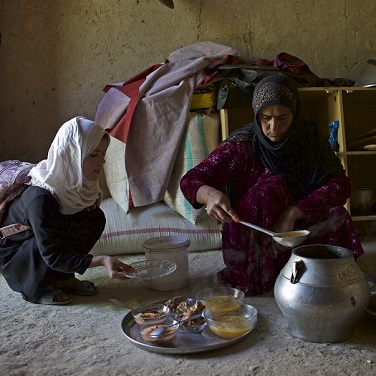
Zubaida serves her daughter lunch
Today, Zubaida designs, makes and sells women’s clothes for AFN 200 to 450 (US $3 to $7) an item, while the clothes she makes for children fetch AFN 150 to 200 (US $2 to $3). Between them, she earns about AFN 6,000 (US $85) a month.
But the impact of her new enterprise isn’t only financial. “Now I’m able to make decisions about my kids and describe my views and opinions in a better way with my family members,” she says.
And her sense of empowerment doesn’t stop there. “My neighbours and relatives see me as a businessperson and as an instructor, which makes me proud,” says Zubaida. “My enterprise has made me famous and it has given me the courage to take part in social activities.”
Having paid her loan back to the group, she is now training six people like her in tailoring entrepreneurship. Not only has her business allowed her to build financial freedom and confidence, it has given her a platform to train and inspire others to improve their own lives.
Zubaida’s results
Monthly income: AFN 6,000 (US $100)
Training six members of her community
Feeding her five children healthier meals
Value chains: all the buzz
Pauline Chemboi hated bees. They buzzed in your ear. They dined openly on your fruit. And the more you gave them a respectful distance, the more they refused to leave you alone. That was in 2013, back when she would sit up at night and worry about the next day’s meal. Today, she loves bees. And she’s never slept, or eaten, better.
“Owning beehives is traditionally a man’s job; we didn’t know we could it,” explains Pauline, beaming, as three of her Baringo County Self-Help Group colleagues tend to the hives behind her. “Many of us were afraid to start the venture, yet now here we are.”
Right around now is when most Hand in Hand Entrepreneur Stories would turn to our training or the generosity of our donors – and to be sure, both played a role. But this is a different kind of story, one that sheds light on the final, most opaque step in Hand in Hand’s job creation model: ‘linking members to larger markets’. Unique among third sector case studies, it starts not with indomitable women of X or the poverty-beating ambitions of Y, but with Ernesto Simeone, a gregarious Italian who saw an ad in the newspaper and decided he could make an easy buck.
Creating jobs in four (not so) simple steps
Hand in Hand’s four-step model is straightforward enough. First, we mobilise Self-Help Groups who support each other, save together and learn together. Second, we teach them the basics of business: bookkeeping, marketing and, if they lack bankable skills, the ins and outs of high-margin vocations such as honey production. Third, we provide microcredit to help them get up and running. And fourth – well, here’s where things can get a bit tricky.
At its core, ‘linking members to larger markets’ means helping them reach more customers. Sometimes that’s as simple as helping improve their branding and packaging. Other times, it means getting their products into actual, physical markets in nearby towns. Increasingly, however, we’re dreaming bigger and plugging our members into regional, national and even international value chains. It’s a strategy borne of a simple need: to make sure members’ businesses long outlast our support.
Which brings us to Ernesto.
The Italian job provider
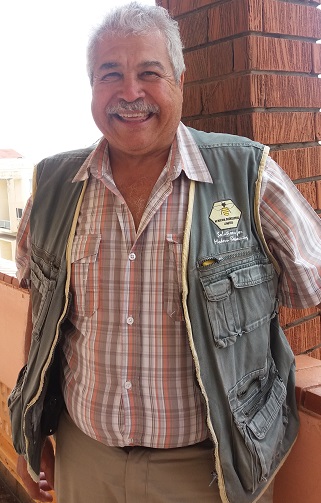
Ernesto Simeone
Ernesto Simeone is a fitting poster-child for international value chains. Italian by heritage, he was born in Kenya, the son of an Italian POW who’d been “frogmarched from Ethiopia by the Brits”. His career in honey stretches back to 1994, when a Japanese company placed an advert in a Nairobi newspaper. “They were looking to buy honey from East Africa. I thought, that’ll be easy: buy some honey from the small-scale guys and sell it,” he says. “It didn’t work out that way.”
For one, the local ‘industry’, if you could call it that, needed modernising. “For me, the honey industry in east Africa is not beekeeping; it’s honey hunting. The quality being produced by these small-scale farmers is not very good. In fact, you can’t trade with it on the international market,” says Ernesto, whose company, an SME called African Beekeepers Limited (ABL), employs about 10 Kenyan staff. Local producers were sceptical of his outsider’s methods. And even if they hadn’t been, Ernesto lacked the infrastructure to train them at significant scale.
If only I could partner with an NGO that had proven experience training grassroots entrepreneurs, he thought.
Great minds
Two-hundred miles south in Nairobi, Hand in Hand Eastern Africa staff were poring through data on value chains. “If only Hand in Hand could partner with a honey producer capable of providing a market for our members,” someone said.
With so few players in Kenya’s honey industry, it wasn’t long before Hand in Hand rang ABL. Days later, they were in a room with Ernesto devising a sustainable, profit-based model that would benefit him, Hand in Hand and, most importantly, our members.
Here’s how it works.
Hand in Hand teaches Self-Help Groups the skills they need to run successful beekeeping enterprises, technical and otherwise. It also provides them with the means: microloans to pay for inputs such as beehives and suits. Ernesto’s company, ABL, sells them those inputs. It also provides them with an ongoing, reliable market – purchasing, packaging and selling their honey under its Bizzy Bee brand.
“Last week, our harvest was 188 kilos,” says Ernesto. “I paid Hand in Hand’s members 70,000 KES (US $700) direct through mobile banking. It’ll retail for about double that at supermarkets.”
As their profits grow, members repay Hand in Hand’s loans – which, in turn, get cycled back to new members. And for as long as people eat honey – whether in Japan or at home in Kenya – producers like Pascaline have work.
“This project has helped us a lot,” she says. “We can pay school fees and food for our homes. Every woman can now support her family.”
Results
1,400 entrepreneurs in honey value chains countrywide
Average yield per co-operative: 70,000 KES (US $700)
Women’s participation rate: 80%
Meet Mageswari, the toy shop owner bringing joy to Pondicherry’s children
By Shivani Kochhar
Mageswari, a toymaker’s daughter, had always dreamed about owning a toy shop. But with no secondary school education and few assets to her name, her dream was destined to never become reality.
That’s life in India, where two out of three working households earn less than 1,000 INR (US $15) per month. Mageswari’s was one of them. She also had a son to worry about.
It runs in the family
Inspiration struck Mageswari’s brother: they could team up to open a toy shop together and sell their father’s hand-carved wooden toys. After all, in business two heads are better than one. But Mageswari’s brother also lacked a credit history or assets, and even microfinance lenders would not consider giving them a loan.
Pondicherry, India
A helping hand
That’s when Mageswari heard about Hand in Hand. The 40-year-old joined a Self-Help Group five years ago with the intention of securing a loan to bring their business idea to fruition. After completing her training, she pooled what little savings she had with a microloan from Hand in Hand India, bought the necessary equipment and rented a shop in the centre of Pondicherry.
The dream team
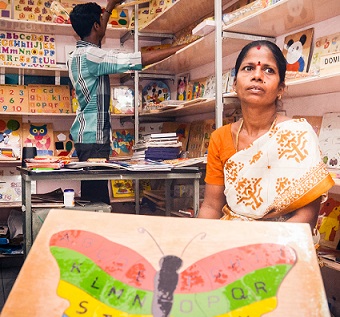 The toyshop was a huge success, reaching a monthly turnover of 57,000 INR (US $880). Brother and sister employ four of fellow Self-Help Group members, spreading their success around the community. “Other toy shops in Pondicherry only sell plastic toys – they are cheaper than our wooden toys but they also last less long,” says the soft-spoken but self-assured Mageswari. These toys leave a legacy.
The toyshop was a huge success, reaching a monthly turnover of 57,000 INR (US $880). Brother and sister employ four of fellow Self-Help Group members, spreading their success around the community. “Other toy shops in Pondicherry only sell plastic toys – they are cheaper than our wooden toys but they also last less long,” says the soft-spoken but self-assured Mageswari. These toys leave a legacy.
Mageswari’s brother, a born entrepreneur, took the initiative to reach out to local schools using a mail marketing campaign and the local press. The schools now place large orders for their toys. “I couldn’t have done this without Hand in Hand’s training and support,” he says. The siblings have even expanded the product range to include specialist Montessori toys.
A fairytale ending
Today, Mageswari has a degree of financial independence she could never have dreamt of before, along with a television and refrigerator to prove it. Most importantly, she can pay for her son’s college education. Before the toy shop, annual fees of 75,000 INR (US$1,166) made college unthinkable. Today, her son is in his second year of electrical engineering.
“We plan to expand our business by buying our own premises and additional machinery,” says Mageswari. Watch this space: maybe one day this brother-sister act will build their own toy shop empire.
Mageswari’s results
Toy shop earns 57,000 INR (US $880) a month
Able to put her son through college
Employs 4 staff from the community
Meet Manimozhi, grinding away for her family’s future
By Shivani Kochhar
With a grandchild on the way, Manimozhi needed funds fast. Her family business, a flour mill, was failing. But without capital and expertise she couldn’t change her fortunes.
A new family member
Manimozhi wanted to give her grandson the best start in life; in Pondicherry, this means being born in a private hospital. Only 1.2 percent of Indian gross domestic product is spent on public healthcare, and many government hospitals lack basic standards of hygiene, particularly in rural areas. For people like Manimozhi, they are an absolute last resort.
Pondicherry, India
Becoming a businesswoman
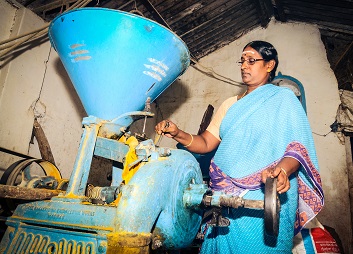 Manimozhi joined a Hand in Hand Self-Help Group with the hopes of using her loan to pay for the costs of the birth. Instead, after receiving training in financial literacy, she ploughed the loan into the faltering mill business she’d inherited from her father and paid for the birth using pure profit.
Manimozhi joined a Hand in Hand Self-Help Group with the hopes of using her loan to pay for the costs of the birth. Instead, after receiving training in financial literacy, she ploughed the loan into the faltering mill business she’d inherited from her father and paid for the birth using pure profit.
Manimozhi’s mill grinds rice, wheat and grains into flour or oil. It’s bring your own grain: customers are only charged for the grinding service. Using her loan, Manimozhi modernised the mill with an automated elevator that feeds paddy into the mill more quickly, speeding up production. Now, customers travel for 30 minutes by tractor to come to the mill. “I’ve opened my own private bank account so I can save better,” she says.
Keep calm and carry on
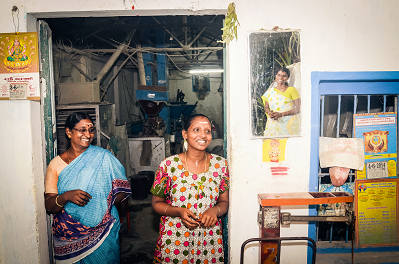
Those savings came in handy when the mill was damaged, its roof torn clean off, during a severe statewide storm that killed almost 50 people in Pondicherry and nearby Tamil Nadu. The cost of rebuilding was IRN 50,000 INR (US$ 766). With her savings in store, Manimozhi wasn’t held back: she got on with the rebuild quietly.
Manimozhi’s is now the longest standing flour mill in the area. The business has been in the family for 55 years and is already providing for two more generations. She now knows how to support her family through the good times and the bad.
Manimozhi’s results
Employs 4 staff members
Pays for grandchildren’s education
Supports 3 generations of her family
